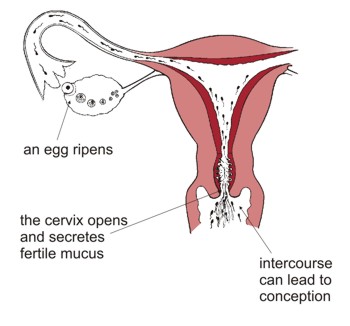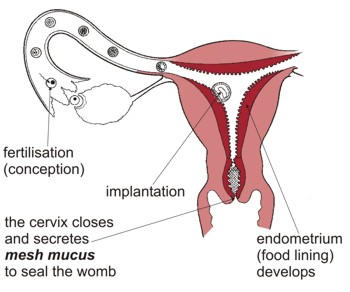understanding your fertility, page 7 of 14
A Conception Cycle

Intercourse in the Fertile Phase
If a couple had intercourse in the egg ripening, fertile mucus phase of the cycle, the sperm will find perfect swimming conditions from the vagina into the open cervix, where they will be stored in the cervical crypts. They will be well fed, matured, primed and released upwards in regular convoys over the next few days to travel through the womb into the fallopian tubes in search of the egg.

Conception and Implantation
If a sperm penetrates the crust of the egg, then fertilisation (conception) is achieved: Day 1 of the new baby’s life.
The baby’s cells divide rapidly as it is propelled down the fallopian tube towards the waiting womb and its nutritious lining.
Within hours of ovulation, the fertile mucus begins to dry up and the mesh mucus returns to seal the womb.
By Day 8: the baby has implanted in its mother’s womb and is sending messages to prevent menstruation.
By Day 17: the placenta is established; the baby’s own blood cells have begun to develop.
By Day 20: the foundation for the entire nervous system is established.
Day 21: the baby’s heart starts to beat!
The baby’s rapid growth continues in its mother’s womb, now cushioned by a fluid sac. The mesh mucus plug continues to function for nine months, sealing the womb and protecting the baby from infection. It is dislodged during at the onset of labour.
- Previous |
- Next |
- Exit Tutorial |
- Help |
- Download as a PDF
© 2007 Fertility Education Trust